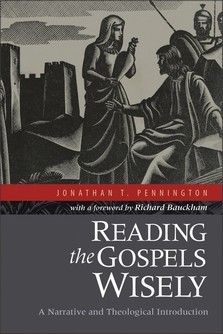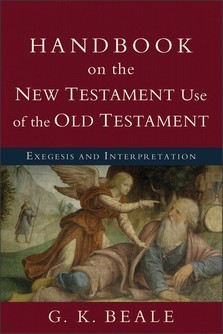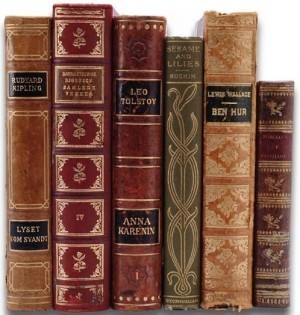Justin Taylor's Blog, page 190
September 21, 2012
9 Reasons We Need the Gospels
 From Jonathan Pennington Reading the Gospels Wisely: A Narrative and Theological Introduction (Baker Academic, 2012), 38-49.
From Jonathan Pennington Reading the Gospels Wisely: A Narrative and Theological Introduction (Baker Academic, 2012), 38-49.
We need to study the Gospels because they have been central to the Church throughout its history.
We need the Gospels because Paul and the other New Testament writers presuppose and build upon the story and teaching of Jesus.
We need a healthy diet of the Gospels because although the written form of the Gospels is subsequent to most of the Epistles, the traditions behind them are not; they go back to the time of Jesus himself and the immediately following years, passed down through oral (and eventually written) repetition.
We need the Gospels because in them we get a more direct sense of the Bible’s great story line.
We need the Gospels because in them we get a concentrated exposure to the biblical emphasis on the coming kingdom of God.
We need the Gospels because there are different languages or discourses of truth.
We need the Gospels because they are in many ways a more comprehensive and paradigmatic type of map.
We need the Gospels because encountering Jesus in narrative helps us grow in experiential knowledge and helps us realize that reality does not always fit into neat little boxes of “truth.”
We need the Gospels because in the Gospels alone we get a personal, upfront encounter with Jesus Christ.
You can read for free online the table of contents, the foreword by Richard Bauckham, and the first chapter, “What Are the Gospels? Defining Gospel.”
The OT in the NT: 5 Presuppositions, 9 Steps, 1 Example
 G. K. Beale’s new Handbook on the New Testament Use of the Old Testament: Exegesis and Interpretation (Baker Academic, 2012) identifies five assumptions or presuppositions of the New Testament which affects how they understood and use the Old Testament:
G. K. Beale’s new Handbook on the New Testament Use of the Old Testament: Exegesis and Interpretation (Baker Academic, 2012) identifies five assumptions or presuppositions of the New Testament which affects how they understood and use the Old Testament:
There is the apparent assumption of corporate solidarity or representation.
In the light of corporate solidarity or representation, Christ as the Messiah is viewed as the true Israel of the OT and the true Israel—the church—in the NT. [Thus, e.g., Isa. 49:3-6 and the use of Isa. 49:6 in Luke 2:32; Acts 13:47; 26:23; note how Christ and the church fulfill what is prophesied of Israel in the OT. Beale notes, "one can hold to the notion of Christ as true Israel and still have room for a hope that the majority of ethnic Jews will be saved as some point in the future. Any such salvation would be in their identification with Christ as true Israel."]
History is unified by a wise and sovereign plan so that the earlier parts are designed to correspond and point to the later parts (cf., e.g., Matt. 5:17; 11:13; 13:16-17).
The age of eschatological fulfillment has come in Christ. [See, e.g., Mark 1:15; Acts 2:17; 1 Cor. 10:11; Gal. 4:4; 1 Tim. 4:1; 2 Tim. 3:1; Heb. 1:2; 9:26; 1 Pet. 1:20; 2 Pet. 3:3; 1 John 2:18; Jude 18.]
As a consequence of the preceding presupposition, it follows that the later parts of biblical history function as the broader context for interpreting earlier parts because they all have the same, ultimate divine author who inspires the various human authors. One deduction from this premise is that Christ is the goal toward which the OT pointed and is the end-time center of redemptive history, which is the key to interpreting the earlier portions of the OT and its promises. [On this, cf. 2 Cor. 1:20; Matt. 5:17; 13:11, 16-17; Luke 24:25-27, 32, 44-45; John 5:39; 20:9; Rom. 10:4.]
Beale also summarizes the steps of his methodology:
Identify the OT reference. Is it a quotation or allusion? If it is an allusion, then there must be validation that it is an allusion, judging by the criteria discussed in the preceding chapter.
Analyze the broad NT context where the OT reference occurs.
Analyze the OT context both broadly and immediately, especially thoroughly interpreting the paragraph in which the quotation or allusion occurs.
Survey the use of the OT text in early and late Judaism that might be of relevance to the NT appropriation of the OT text.
Compare the texts (including their textual variants): NT, LXX, MT, and targums, early Jewish citations (DSS, the Pseudepigrapha, Josephus, Philo). Underline or color-code the various differences.
Analyze the author’s textual use of the OT. (Which text does the author rely on, or is the author making his own rendering, and how does this bear on the interpretation of the OT text?)
Analyze the author’s interpretative (hermeneutical) use of the OT.
Analyze the author’s theological use of the OT.
Analyze the author’s rhetorical use of the OT.
So how does this actually work in practice?
The best thing to do would be to pick up a copy of his book. You can go here to read Beale’s introduction and first chapter for free. You can also see this methodology played out through the New Testament in Commentary on the New Testament Use of the Old Testament, edited by Beale and Carson.
You can also listen to (or watch below) an hour-long lecture by Dr. Beale on Matthew’s use of Hosea 11:1 in Matthew 21:5, where it says that Joseph, Mary, and Jesus stayed in Egypt until the death of Herod, and that “this was to fulfill what the Lord had spoken by the prophet, ‘Out of Egypt I called my son.’”
As Beale explained in one interview, “The problem is, when you go back to Hosea 11:1, it’s not a prophecy. It’s just a description of Israel coming out of Egypt hundreds of years earlier. If a student were asked on test, ‘Is Hosea 11:1 a prophetic statement?’ many teachers would give them an F if they said yes.”
If you’re looking for a summary of Beale’s answer, here it is in a paragraph from another interview:
I contend that throughout the book of Hosea itself not only is the first exodus mentioned quite a bit, but so too a second exodus that was to occur in the latter days. The best example is Hosea 11. In verse 1 he mentions the historical exodus, but the chapter concludes with the prophecy that God will bring them out of Egypt in the future. In fact, in the middle of the chapter it even says they will return to Egypt a second time. There are a number of places where Hosea mentions a first exodus and elsewhere a second exodus, and he does this right in chapter 11 multiple times. If you asked Hosea “Hosea, did you see that the end of Israel’s history was to be shaped like its beginning at the exodus?” I think he would say, “Yes.” That’s why Hosea sees that there is going to be a future exodus that is replicating or recapitulating a first exodus. If that’s the case, then Matthew is just recognizing Hosea’s own typological method.
September 20, 2012
How They Made the Movie Version of the Les Misérables Musical
HT: 22 Words
We Don’t Need a President Who Works Magic or Would Be Your Friend
George Will reflects on the “political infantilism” that asks which presidential candidate you would “prefer to have take care of you if you were sick” and which “would you rather invite to dinner at your home,” along with “the dominant superstition of American politics” that feeds “national narcissism, namely the idea that events can be “controlled by a president doing— even just saying — something.”
For once, he writes, it’d be nice to hear a candidate like Mitt Romney say something like the following:
I am not running to be your friend, because I hope you pick your friends from among people you actually know and for reasons unrelated to politics. And I will not insult your intelligence by claiming to feel your pain, which really is yours. Neither will I tell you that as president I would pacify distant mobs. I am running just to make government somewhat less destructive, to partially ameliorate the country’s largest afflictions and to make the world a bit less dangerous.
My candidacy comes down to an eight-word question, and it is not ‘Will you call me about your tummy ache?’ Rather, it is: ‘Is this really the best we can do?’ It is difficult to prevent Americans from briskly creating wealth, but bad choices by both parties have done so. My opponent is making many promises, although a simple apology would suffice. My promise is that although I will not really create millions of jobs, I will, if Congress cooperates, remove some of the obstacles to your doing so.
If you want a president who is the center of a government-centered society, pick the other fellow. If you endorse a dependency agenda — more and more people dependent in more and more ways on a government fewer and fewer are paying for — vote for the other party. If you do not share my opponent’s horror about being mostly on your own in the pursuit of happiness that you define on your own, give me a try. If it doesn’t work out, you can fire me in four years.
An Album You Can Argue With
Propaganda is one of the hip hop artists on the Humble Beast label. You may have seen his spoken word piece, G.O.S.P.E.L. You may have heard his earlier album, or even seen him perform live. But you probably haven’t heard his newest album yet. Excellent is dropping on September 25th, and I’ll be honest-some of you aren’t ready for it. It’s too different, too much—too hard. And I don’t mean hard like it will blow your hair back. I mean this album is hard in its content, confrontation, and cause. It’s an album that will stir you and challenge you. If you try to just kick back and easily enjoy it you just might find yourself unprepared to wrestle with Propaganda’s grave, yet gracious words.
You have to listen to Excellent like you’re supposed to listen to a person, not like one might mindlessly listen to your average pop album. You need to listen to this album to understand, not just enjoy. If you do the former, you’ll get the latter.
So, what does it sound like? I’m smiling while I try to think of the words to use… I’m listening to it for the sixth time as I write this. This is not just a different kind of hip hop album, it is elevated. It is excellent. The beats and music are the work of Beautiful Eulogy who handled all the production and delivered a completely original (and I mean that in every way, no sampling) urban, bluesy, acoustic, electronic sound. As I was saying above, the lyrics are strong, but strong lyrics with weak lyricism equals an impotent album. Thankfully Prop’ is genuinely gifted. His rap is powerful and persuasive, and his delivery is varied throughout every track. This album is never static, but it is consistent-consistently creative, fun, surprising, and passionate.
Excellent is proving to be one of the best things I’ve heard in a long time.
Like all of the Humble Beast releases you will be able to download the entire album for free on September 25th. But, if you can you should pre-order/purchase it through iTunes or Amazon.com ($9.99) to support the artist and label.
Go to Joe’s site to stream a song for free.
I listened to some of the pre-album release yesterday. For one of the songs in particular—you can listen for yourself to figure out which song it might be—I began constructing a counter-argument in my head for why Propaganda is wrong. I did the same thing when I saw him give a live performance of another song. The details of that are less important than the fact that this is an album that makes arguments. These arguments might be right or they might be wrong; they might be prophetic or might be overstatements. But they are arguments that make you think and make you uncomfortable and invite you to talk back. I don’t know about you, but I simply don’t have that experience when listening to other types of music.
So consider giving this a listen. You’ll find a brother who doesn’t want to quarrel, but does want to argue. And he might just win you over.
September 19, 2012
Was Jesus Crucified at the Third Hour or the Sixth Hour?
“And it was the third hour when they crucified him” (Mark 15:25).
“Now it was the day of Preparation of the Passover. It was about the sixth hour. [Pilate] said to the Jews, ‘Behold your King!’” (John 19:14).
How do we reconcile these two accounts? And what do “third hour” and “sixth hour” even mean?
Here is my answer for “TGC Asks”—along with a helpful chart on time reckoning in the first century.
For those wanting more on how to think about apparent discrepancies in the Gospel accounts, I would recommend Craig Blomberg’s The Historical Reliability of the Gospels and The Historical Reliability of John’s Gospel, and now Vern Poythress’s more focused book on Inerrancy and the Gospels: A God-Centered Approach to the Challenges of Harmonization (due out next month).
September 18, 2012
How a 16-Year-Old Girl Explained the Sacraments to a Catholic Interrogator in 1554
In early 1554 Queen Mary I sent John de Feckenham to seek to persuade her 16-year-old Protestant cousin, the Lady Jane Grey, of the truth of the Catholic faith, thereby avoiding execution. Feckenham was unsuccessful, and she was beheaded February 12, 1554.
After dialoging about justification by faith, they turned to the subject of the sacraments:
Feckenham. — How many sacraments are there?
Lady Jane. — Two; the one the sacrament of Baptism, and the other the sacrament of the Lord’s Supper.
Feckenham. — No, there are seven.
Lady Jane. — By what scripture find you that?
Feckenham. — Well, we will talk of that hereafter. But what is signified by your two sacraments?
Lady Jane. — By the sacrament of Baptism I am washed with water, and regenerated by the Spirit, and that washing is a token to me that I am the child of God. The sacrament of the Lord’s Supper offered unto me, is a sure seal and testimony that I am, by the blood of Christ which he shed for me on the cross, made partaker of the everlasting kingdom.
Feckenham. — Why, what do you receive in that sacrament? Do you not receive the very body and blood of Christ?
Lady Jane. — No, surely, I do not so believe. I think that at the supper I neither receive flesh nor blood, but bread and wine, which bread, when it is broken, and which wine, when it is drunken, putteth me in remembrance how that for my sins the body of Christ was broken, and his blood shed on the cross, and with that bread and wine I receive the benefits that came by the breaking of his body, and shedding his blood for our sins on the cross.
Feckenham. — Why, doth not Christ speak these words, Take, eat, this is my body? Require you any plainer words? Doth he not say, it is his body?
Lady Jane. — I grant he saith so; and so he saith, ‘I am the vine, I am the door’: but he is never the more the door nor the vine. Doth not St. Paul say.
He calleth things that are not, as though they were? God forbid that I should say that I eat the very natural body and blood of Christ; for then either I
should pluck away my redemption, or else there were two bodies, or two Christs. One body was tormented on the cross, and if they did eat another body, then
had he two bodies; or if his body were eaten, then was it not broken on the cross; or if it were broken on the cross, it was not eaten of his disciples.
Feckenham. — Why, is it not as possible that Christ by his power could make his body both to be eaten and broken, and to be born of a woman without man, as to walk upon the sea having a body,and other such like miracles as he wrought by his power only ?
Lady Jane. — Yes verily. If God would have done at bis supper any miracle, he might have done so; but I say that then he minded to work no miracle, but only to break his body, and to shed his blood on the cross for our sins. But I pray you to answer me to this one question. Where was Christ when he said, “Take, eat, this is my body”? Was he not at the table when he said so? He was at that time alive, and suffered not till the next day. What took he but bread? What brake he but bread? Look, what be took he brake, and look, what he brake he gave, and look, what he gave they did eat; and yet, all this time he himself was alive, and at supper before his disciples, or else they were deceived.
For an introduction to the moving story of this young woman’s life and testimony, see Simonetta Carr’s new Lady Jane Grey. You can see a brief overview below, along with some of the artwork from the book.
How Dramatic Moments in Church History Come About
Mark Noll:
The church survives by the mercy of God, not because of the wisdom, purity, or consistent faithfulness of Christians. Nonetheless, many moments of unusual faithfulness can be found in the Christian past, both recent and ancient. It is important to note, however, that even when such moments turned out to make a dramatic difference for later history, they almost always resulted from gratitude to God rather than a desire to influence the future.
—Turning Points: Decisive Moments in the History of Christianity
HT: Dave DeWit
Does Your Church Pray Together?
Sinclair Ferguson on some of the things that Acts 6:7). If this is so, it should not surprise us that while many churches see growth, it is often simply reconfiguration of numbers, not of conversion. I greatly wish that our churches would learn to keep the main things central, that we would learn to be true Churches, vibrant fellowships of prayer, Gospel ministry and teaching, genuine mutual love. At the end of the day, such a Church simply needs to “be” for visitors who come to sense that this is a new order of reality altogether and are drawn to Christ.
September 17, 2012
Four Things to Remember and Eight Things to Avoid When Reading the Classics
 John Mark Reynolds on what to remember:
John Mark Reynolds on what to remember:
1. Most great books require time, much time, to even begin to unlock the good stuff. The process of finding what an author such as Plato said is as important as the “truth” found there. One joy of reading outside an academic context is that there are no deadlines; nobody is grading you. Take the time to read until you see.
2. Try not to read alone. Get a small community, read, and discuss. Don’t be ambitious, but do form a small group of fellow readers. My wife belongs to a women’s group of different ages reading patristic theology together. I know communities all over our area where busy people gather to read and discuss the great texts. Social media will help you find such friends, but try to meet together at least once a month.
3. Reading a great text brings benefits, but these benefits work in “agricultural time,” not computing time. You sow and then you reap, but the seeds take a bit just to germinate let alone come to the point of harvest.
4. If we can love our enemies, surely we can love Darwin! Read these great works charitably and with humility. Understand something, appreciate it, and only then judge it. Some Christians stripmine great books for the “good stuff” and hastily condemn the “bad stuff.” Just as a stripminer may destroy beauty in his haste to get coal, so too an overly hasty conclusion about what Christians should learn from a great book may keep the reader from seeing glory of the whole.
Leland Ryken—who has said, “Next to not reading the classics, the greatest abuse we can heap on them is to misread them”—outlines eight ways this can happen. (Remember that the bold numbered points are fallacies—not actual advice!)
1. Be sure to read the classics for their ideas. C.S. Lewis: “Many of the comments on life which people get out of Shakespeare could have been reached by very moderate talents without his assistance.” Reducing literature to ideas, Lewis says, “is an outrage to the thing the poet has made us for.” Flannery O’Connor: “The whole story is the meaning, because it is an experience, not an abstraction.”
2. Assume without question that the classics tell the truth. Lewis: “The values assume in literature have seldom been those of Christianity.”
3. Look upon the classics as “improving literature.” In other words, this misconception goes, it’s the sort of thing you should read but wouldn’t want to read. Ryken counters: “I suggest that we view the classics as a form of entertainment first of all. Any usefulness they might hold can come as a byproduct. . . . I prefer them over most other reading material because I think they are more fun.”
4. Regard the classics as beyond criticism. Ryken: “The classics are worthy of our admiration and should make us feel humble, but we should not venerate them as something sacred.”
5. Assume that moral considerations are irrelevant to the classics. Ryken: “The classics generally espouse a system of virtues and vices with which a Christian can agree. But when we turn virtues and vices to the values espoused by the classics, we suddenly have to scale down the claims we make for their compatibility with Christianity.”
6. Be sure that you do not see anything in the classics that the author and original audience did not see it in it. This is the intentional fallacy. Ryken: “We must protect an author’s right to be misunderstood. But having understood a writer, we are not limited to see in a work only what the author saw there.”
7. Assume that all that matters is what a work says to you. This is the affective fallacy. Ryken: “We should not try to suppress our responses. They are important. But they are always subject to modification and correction by the work itself.”
8. View the classics as relics in the museum of the past. Ryken: “I am not indiscriminately interested in the past for its own sake. Much more valuable to me is what is universal in the classics. They have an unparalleled ability to capture what is true for all people at all times in all places.”
—Leland Ryken, Realms of Gold: The Classics in Christian Perspective, pp. 8-13.
Justin Taylor's Blog
- Justin Taylor's profile
- 44 followers





